![How to Create a Corporate Training Budget [With Template]](https://img.shgstatic.com/clutch-static-prod/image/resize/715x400/s3fs-public/article/f8cb0a8fb8e36a14ff257e02ce8b9475.jpg)
![How to Create a Corporate Training Budget [With Template]](https://img.shgstatic.com/clutch-static-prod/image/resize/715x400/s3fs-public/article/f8cb0a8fb8e36a14ff257e02ce8b9475.jpg)
Updated February 18, 2026
Small businesses are entering 2023 with undeniable confidence about revenue growth and team expansion. Outsourcing work to agencies, freelancers, and consultants allows companies to scale as they please while filling mission-critical skills gaps. The benefits of working with external teams fuels business confidence and success.
As 2023 begins, market signals show the high inflation rates that closed 2022 may start to cool off.
This is welcome news for small businesses that spent the bulk of 2022 feeling anxious about financials.
Looking for a BPO agency?
Compare our list of top BPO companies near you
Despite the past year's struggles, small businesses remained bullish about their 2023 outlook as 2022 ended.
With inflation expected to trend downward, SMB confidence is validated and likely to increase. There’s less of a perceived financial threat.
While the outlook is improving, there’s still some uncertainty. That means that small businesses will need to be agile and able to scale quickly in response to market changes. This is where outsourcing work to agencies and specialists comes into play.
Most small businesses use outsourced business services and freelancers to scale quickly and effectively. Clutch surveyed 517 small business leaders with experience working with external service providers to uncover the nature of outsourced collaborations.
Given the results, we anticipate more small businesses will turn to external agencies and freelancers to handle business tasks this year.
Looking for a firm to help you with an upcoming project? Find companies with specializations in marketing, development, design, IT services, and more to connect with the right company on your timeline.
Rather than prioritizing cost-cutting measures, small businesses are leaning into their core business in 2023.
The most common objectives for 2023 are growing business revenue, building their teams, and acquiring new customers.
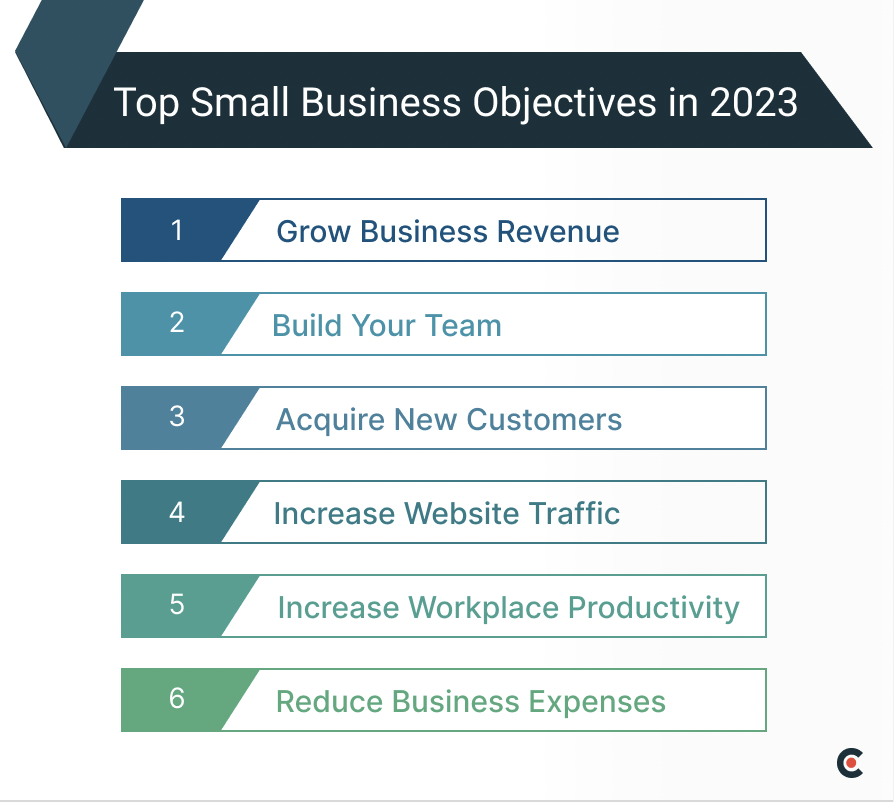
Each goal indicates a desire for growth and expansion in the year ahead. The least popular business objectives were reducing expenses and increasing workplace productivity, highlighting relative contentment in existing internal operations.
Small businesses aren’t minimizing themselves in the face of economic uncertainty. Instead, they’re actively deciding that this is the time to differentiate themselves from competitors.
Carlos Barros, Director of Marketing of the cloud-based electronic point of sale (POS) software provider Epos Now, agrees that now is the perfect time for small business leaders to position themselves for growth.
“Thinking outside the box is crucial. Focusing on innovating products and services or breaking into new markets where competitors may not already exist can give an edge over others who are just relying on traditional methods of doing business amidst uncertainty.” – Barros
While many companies aim to achieve more revenue, larger headcounts, and more new customers this year, not all will develop aggressive strategies to match their goals. Some will attempt to wait out all uncertainty and maintain traditional operations. Smart business owners can catapult themselves ahead of competitors by using 2023 to grow and differentiate.
A potential recession is on small businesses’ radar. Concern about a recession will motivate leaders to search for economical solutions to business needs.
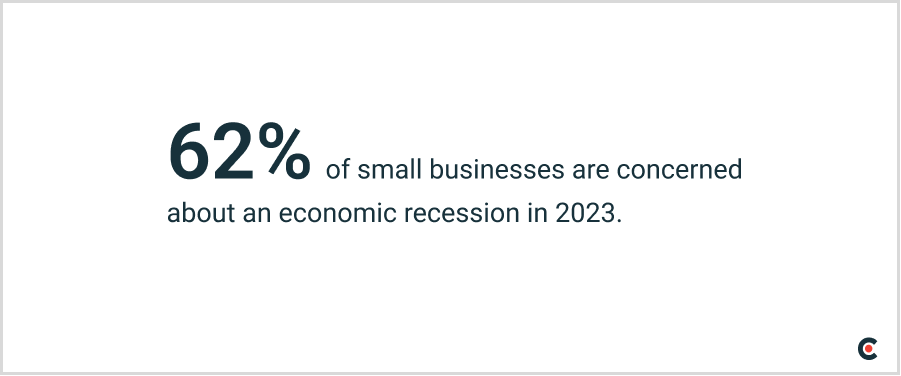
While most SMBs understand the possibility of a recession in 2023, they’re not operating in fear because of their well-crafted plans to work against whatever presents itself.
Take Jonathan Prichard, for instance. Founder and CEO of e-comm company Mattress Insider, Prichard has been outsourcing marketing, advertising, SEO, and web development tasks to agencies and freelancers for over a decade. He believes small businesses have the characteristics for thriving — even through tough economic times.
“Small business owners are resilient. There is more optimism for the future today despite economic challenges because small business owners know what might be coming.” – Prichard
Because a potential recession has been possible, small businesses have had the opportunity to react and devise plans to counter any adverse effects. Our data finds this accurate as well.
Despite the concern about a recession, small businesses are taking active stances to secure their revenue lines.
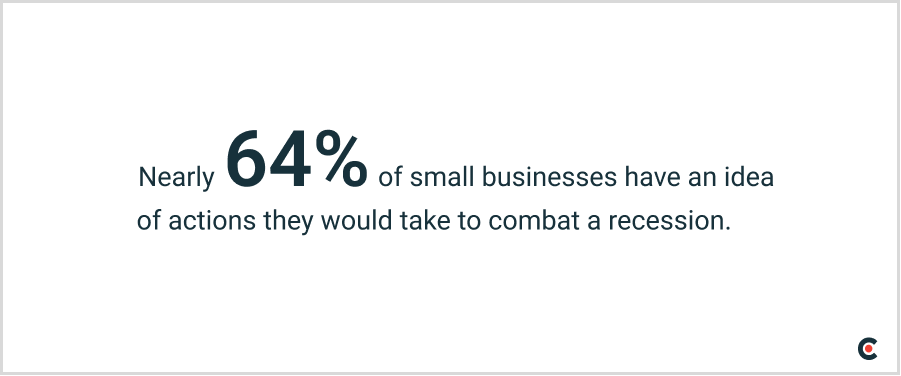
In the event of a recession, small businesses have plans. If they haven’t formulated action plans already, they’re preparing for any uncertainty that could arise in 2023.
Christopher William, the founder of the politically-neutral Balanced News Summary news app, represents one of these business owners with confidence in small business forethought and planning in 2023.
“The fact that small businesses are planning for a possible recession in 2023 suggests that they are being proactive and are taking steps to ensure the resilience and sustainability of their businesses.” –William
Plenty of small businesses were tasked with being ‘resilient’ and ‘perseverant’ in the wake of the COVID-19 pandemic. After the struggles the pandemic has caused for business leaders, companies are now planning their strategies around unforeseen circumstances.
We know most small businesses intend to expand, scale, and grow in 2023 — but how will they do so
Companies are continuing and building upon their relationships with outsourced service providers — professional agencies, freelancers, and consultants — as part of their growth strategies.
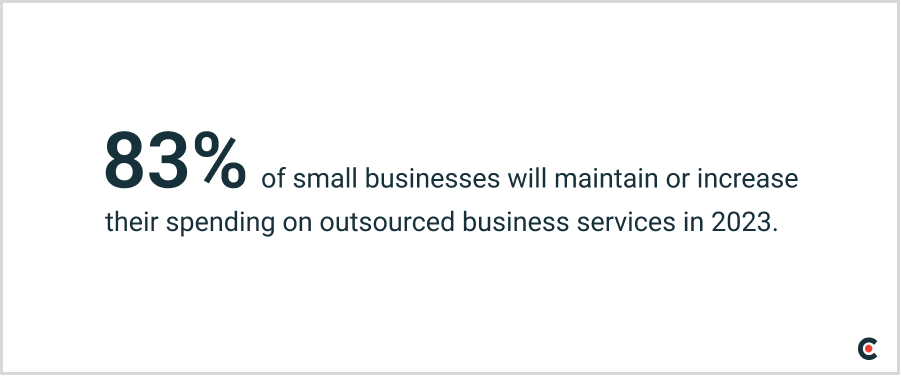
The benefits of outsourcing include the ability to quickly scale up or down, fill skills gaps, supplement a current team, acquire flexible, temporary services, and access labor faster and cheaper than hiring an internal team member.
Companies choosing to outsource to service providers will be better positioned to scale according to their budgets and needs.
Patrick West, owner of experiential marketing company Be The Machine, outsources to specialists and small agencies targeted based on project needs.
West applauds the expert contractors he collaborates with and appreciates how they afford his business to function with more agility.
“Contracting with outsiders certainly makes financial sense as they allow small business owners to avoid the headaches that come with trying to make it all happen in-house. The uncertainty of our current economic times, coupled with the learnings from COVID, reinforces to business owners the need to stay nimble and minimize overhead.” – West
Hiring an agency will help small businesses remain light-footed as they grow and expand into new areas in 2023.
The most desired benefits of outsourcing business activities to agencies and freelancers are reducing expenses, filling skills gaps, and scaling the business.
Each of these top perks is a product of each other: by contracting an agency to fill skills gaps, companies can expand and scale into new focus areas without incurring the costs of hiring, onboarding, and training new internal teammates.
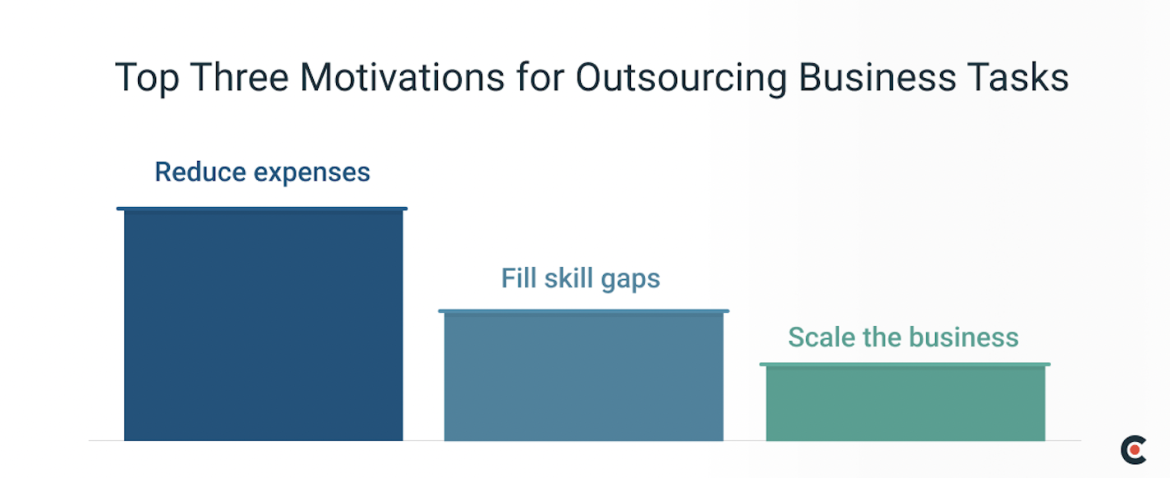
This is good news for small businesses because all companies that use external agencies will reap these benefits without any additional investment or planning.
Alvin Wei, CMO, and Head of Strategy of e-commerce store optimization tool SEOAnt is satisfied with the results of collaborating with an outsourced copywriting agency throughout their four-year partnership.
“Outsourced providers chip in with expertise that helps to plug in what is lacking in-house, ensuring that small businesses can still compete even with a limited budget.” – Wei
Wei also notes that hiring an agency has been an expense reduction for his business, weighing the costs of hiring against those of agency partnerships. Wei finds an assortment of related costs when hiring employees: insurance benefits, onboarding costs, etc.
Hiring an agency doesn’t require these expenses but allows new skills to be introduced into the company.
Small businesses are hiring outsourced providers to help them flourish in 2023, and each company will have its own perceived growth strategies. Some types of service providers will be called on more often than others to spark desired growth.
Companies are most focused on hiring outsourced services to support marketing, IT, and design projects in 2023.
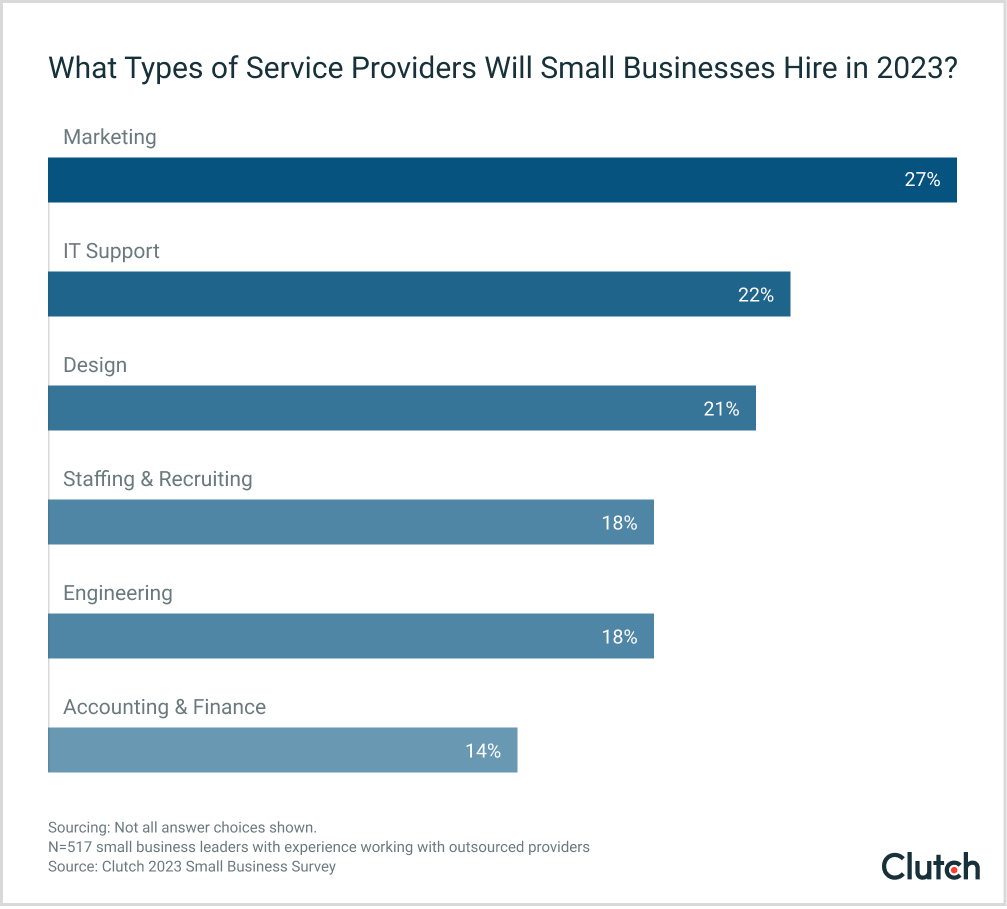
Why all the interest in these functions? First, it’s important to note that marketing, IT, and design are often leveraged digitally. Post-pandemic, companies are increasingly emphasizing growing their online presence because of shifting consumer trends.
Still, companies can use marketing, design, and IT support for even more than digital transformation efforts. Below is an overview of the multitude of ways outsourcing these functions can help businesses.
Marketing encompasses so many different services and activities to promote the buying or selling of a product or service. A full-service marketing agency can offer a full range of services that cover small businesses across several goals and objectives.
Here are just a few types of marketing services that an agency can assist with:
Given the vast array of possibilities for a marketing campaign or effort, it makes sense that small businesses would look here first to fill skills gaps and invest.
Browse top-rated digital marketing companies on Clutch.
The need for IT support services continues to grow along with remote working trends and tech and digital transformations within small businesses.
Companies that weren’t equipped to manage remote work are now connecting with resources to do so safely.
IT support services can include help desk services, cybersecurity services, and data storage services.
Connect with expert IT services companies on Clutch.
Like marketing, design work can take various forms that serve different purposes. Additionally, design work can significantly increase engagement and brand awareness.
Here are some types of work that design agencies regularly provide:
One of the biggest reasons customers leave company websites is a poor layout and design features. This is why design projects often have high ROI and elevate the professionalism of brands.
Find the best design agencies on Clutch.
Small businesses aren’t hiring external agencies and specialists for simple, ad hoc work. Outsourced service providers are a critical part of many company business operations —the proof is in annual small business outsourcing spending.
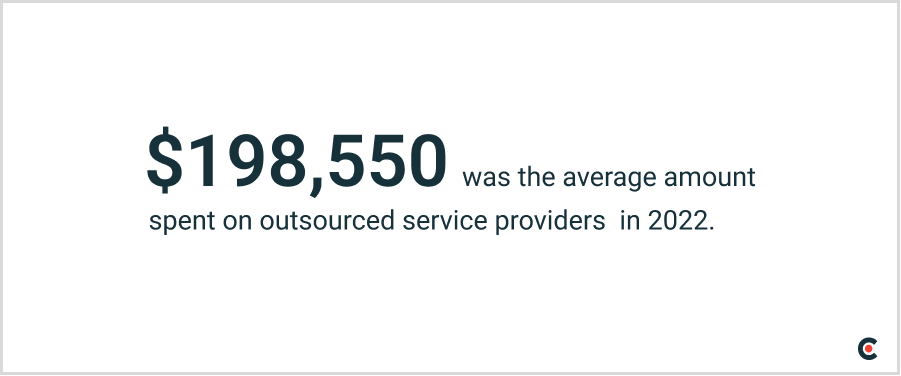
With companies planning to expand their use of agencies in the coming year, these numbers are only expected to increase.
Sergio Diaz has been outsourcing SEO, web development, administration, content, legal, and accounting for five years as the CEO and owner of Keynote Speaker Agency. In the company’s global mission to book experts at conferences and events, the business runs mostly off the efforts of freelancers and agencies.
Diaz’s outsourcing strategy highlights the importance of flexibility in business partnerships.
“We spend a great deal on outsourcing because it allows us the flexibility to find great talent for specific tasks we need to be done.” – Diaz
The accommodating nature of working with agencies allows companies like Diaz’s to pivot effortlessly when needs change or evolve.
The spending on outsourced business services only increases depending on the size of the client. Small businesses with ten or few employees spent an average of $120,887 on outsourced services, while those with more than 250 employees spent well over $300,000.
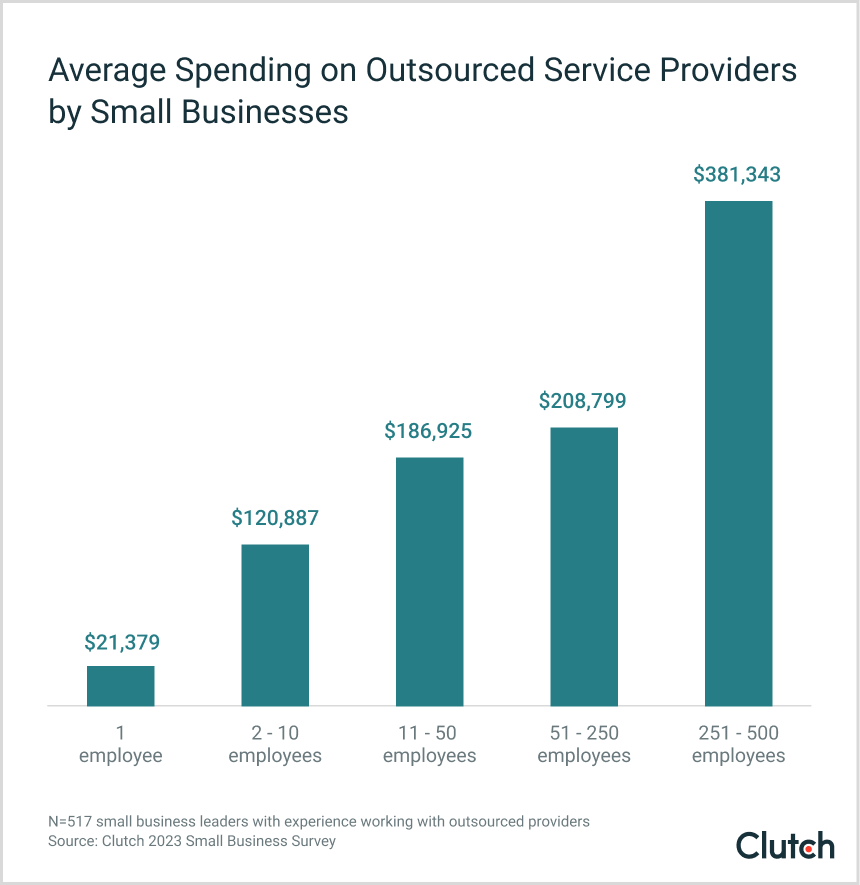
This graph reaffirms the concept of scale: the more opportunities for small businesses to grow, the more opportunities for outsourcing to benefit them. Of course, larger businesses are also better positioned to spend more on outsourced services because of their relative size.
Professional firms and agencies are regularly used outsourced vendor types by most small businesses, making them more popular than freelancers or consultants.
Over half of small businesses (52%) regularly use services from a professional firm or agency.
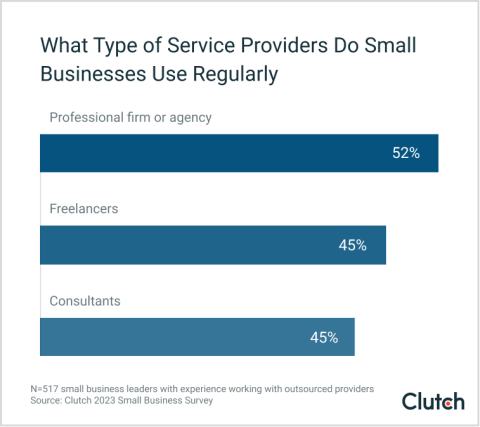
Agencies can be full-service or specialized and offer entire teams to their clients. This allows them to scale up or down quickly, even for complex projects. In that respect, an agency will likely be able to take on the entire project scope than its counterparts.
Further, agencies operate as organized entities, often having their project management resources. It isn’t uncommon for a project manager to be assigned to client projects to keep the project running smoothly. Especially when working remotely, having this level of organization and assuredness is a must for small businesses on deadlines.
Chris Glarner, co-owner of the e-commerce shop New Moon Beginnings, has been outsourcing content writing for more than a year. Glarner commends agency collaborations for their structure and opportunities for feedback.
“Freelancers need more management and often don't have systems in place that fit all or most companies, so the business owners end up having to manage the freelancers. Agencies typically have an organizational structure that allows feedback to a manager who then manages the specialist actually performing the work for the business.” – Glarner
Glarner benefits from agencies and freelancers but recommends professional firms and agencies for complex projects requiring more management.
Before starting a new engagement with outsourced service providers, companies must understand the nature of working relationships and communication structures with potential partners.
Small businesses seek a balance between cost and industry experience when considering different outsourced companies for contracts.
The top factors that encourage small businesses to seek outsourced business services are price, expertise, and team diversity — with cost and experience neck-in-neck as the top priority.
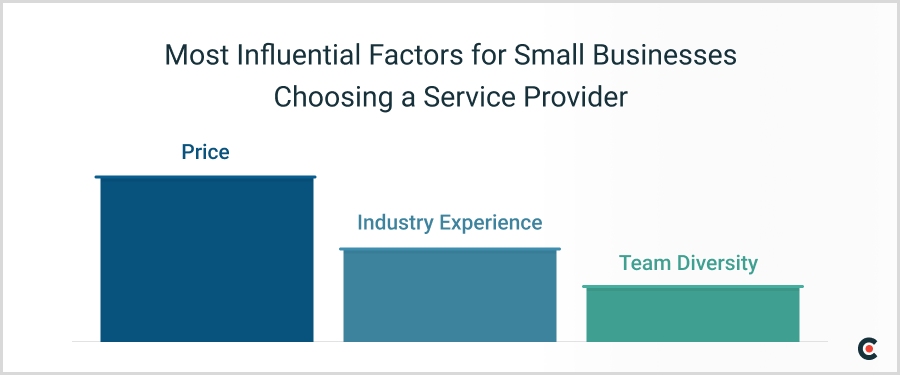
With experience and price about even, we learn that agency clients aren’t willing to sacrifice service providers’ qualifications for a lower price.
Many businesses find that they can strike a good balance between price and experience through outsourcing. Kimberly DeCarrera, Esq. at DeCarrera Law has seen this as a fractional service provider in the legal industry and as someone who outsources tasks to ghostwriters, accountants, freelance graphic designers, marketers, and IT personnel.
DeCarrera plans to hire even more outsourced service providers this year and emphasizes the wealth of industry experience available at affordable prices, using her practice as an example.
“As an experienced business lawyer, paying me a full-time salary to be your in-house general counsel will be really expensive. But if you can get my knowledge and expertise at a fraction of that cost, would you take it? And if I can bring the lessons to your small business that I’ve learned at larger businesses similar to yours, how valuable would that be to you?” – DeCarrera
The search for the perfect business partner doesn’t end with price points and expertise — companies are looking for diversity too.
Businesses recognize the value of team diversity when taking on new projects. Studies have long shown that diverse teams are better at processing facts and innovating than more homogenous groups. Small businesses know this and are looking for diversity in their outsourced teams.
Rather than approaching 2023 with hesitancy, small businesses remain confident about their performance and the wealth of opportunity available this year.
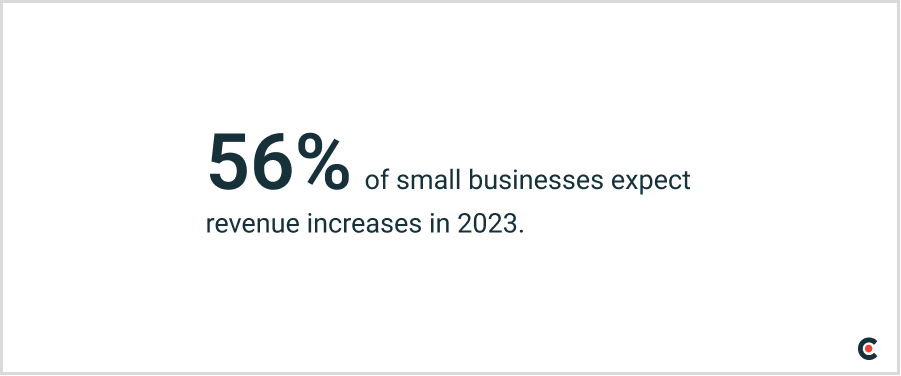
Following a few difficult years navigating a global pandemic, small businesses have learned how to be resilient and innovative in their operations.
Businesses are anticipating challenges in 2023, but they’re prepared. Unlike the surprise emergence of COVID-19, companies can see possible economic fluctuations on the horizon and react. Eager to grow, small businesses are structuring their companies to sustain revenue growth rather than simply weather the storm.
Logan Lewis, CFO of software dev house EnterBridge Technologies, believes that now is the time for small businesses to invest in market opportunities and take steps toward scaling their company.
“Now is the time for small businesses to take advantage of gaps in the market and decreases in labor costs. Most small businesses are looking to capitalize on versus just survive this recession.” – Lewis
Having outsourced marketing and financial planning and analysis for over 20 years since his company’s inception, Lewis recognizes the importance of outsourcing for small businesses operating in this context.
Businesses aren’t ignorant of the challenges inflation is putting on the market.
Inflation is the most-cited small business challenge moving into 2023, putting pressure on small businesses to make strategic decisions.
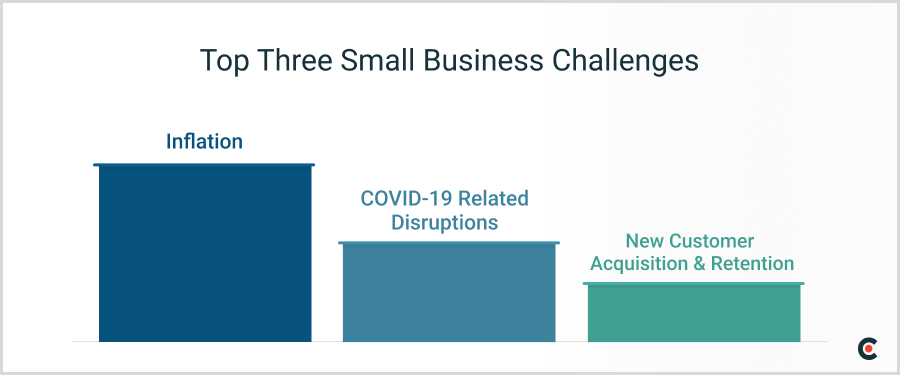
Aside from inflation, companies are also challenged by lingering COVID disruptions and growing customer bases. COVID-19 disruptions were a greater concern for businesses in the healthcare and hospitality spaces.
While inflation was the top challenge for most small businesses, there were some industries where COVID-19 was still a standout. Hospitality and healthcare companies, in particular, rated COVID-19 disruptions as the most significant issue in 2022.
No matter the most pressing challenge in 2022, small businesses didn’t realize these challenges late in a state of frenzied unpreparedness. It’s actually quite the opposite. Companies are carefully examining upcoming challenges and making active plans to combat them.
One of many small business owners feeling confident about growth this year is Tommy Gallagher, founder of digital banking resource Top Mobile Banks.
“As a small business owner, it is essential for me to stay informed about the economic landscape and to be prepared for any potential setbacks. Given the current economic climate, I am optimistic about the prospect of revenue increases and hiring in 2023.” – Gallagher
Gallagher also mentioned that outsourcing SEO and social media tasks outside his core competencies helps him reinvest time and resources into his company. Gallagher finds that specialized service providers even help him reduce costs and can take advantage of economies of scale.
The financial landscape isn’t impeding business hiring confidence. Internal team growth remains a top priority for small businesses.
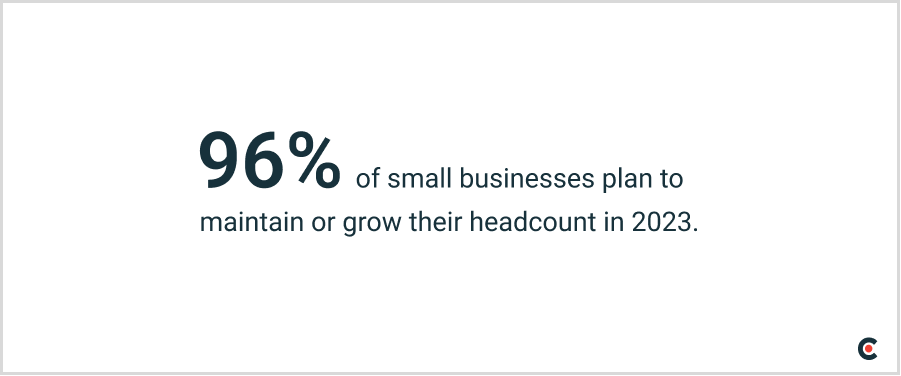
Zachary Colman, CEO of Creatitive – a branding agency supporting athletic clients – finds that it’s vital for companies to hire internally and externally this year to position themselves in the most competitive ways possible.
“Companies need more than just delaying projects and sacrificing opportunity costs. We also need to take some risks.” – Coleman
Like many companies, after a difficult experience with COVID disruptions, Coleman is ready to take calculated risks to net his business profit. Coleman has outsourced digital marketing activities for the past three years and finds connecting with outsourced business services crucial to taking calculated risks.
Small businesses are entering 2023 prepared with action plans and strategic roadmaps for growth. They’ve evaluated potential uncertainties thoroughly and approached the year confidently.
Outsourced service providers (agencies, freelancers, and consultants) are a big part of upholding small business confidence. Outsourced business services offer their clients decades of industry expertise and the ability to flexibly scale up or down as needed.
Both characteristics will help small businesses thrive in 2023 and warrant the expected increased investments across business functions.
Clutch can help you find the right agency faster. Connect with top-rated agencies across industries by reading verified client reviews, examining project portfolios, and evaluating costs.
Clutch surveyed 517 small business leaders in the US with experience with outsourcing in December 2022. The survey accounts for companies with under 250 employees across a broad cross-section of industries.
Fifty-two percent (52%) of respondents are female; 48% are male.
Thirty-seven percent (37%) are 18 to 34; 53% are 35 to 54; 10% are 55 or over.
Five percent (5%) of respondents’ businesses have one employee; 20% have 2 to 10 employees; 27% have 11 to 50 employees; 32% have 51 to 250 employees; 14% have 251 to 500 employees.
Respondents are from the South (40%), West (18%), Midwest (23%), and Northeast (19%).
![How to Create a Corporate Training Budget [With Template]](https://img.shgstatic.com/clutch-static-prod/image/resize/715x400/s3fs-public/article/f8cb0a8fb8e36a14ff257e02ce8b9475.jpg)

